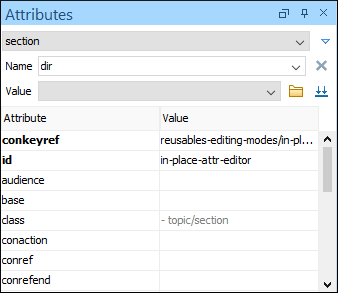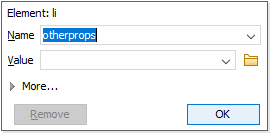Attributes View in Author Mode
The Attributes view presents all the attributes of the current element determined by the schema of the document. By default, it is located on the right side of the editor. If the view is not displayed, it can be opened from the menu.
- The CSS stylesheet associated with the document does not specify a false value for the -oxy-editable property associated with the element.
- The element is entirely included in a deleted Track Changes marker.
- The element is part of a content fragment that is referenced in Author mode from another document.
- The names of the attributes are rendered with a bold font, and their values with a plain font.
- Default values are rendered with a plain font, painted gray.
- Empty values display the text "[empty]", painted gray.
- Invalid attributes and values are painted red.
list in the schema of the edited document, the
Value column acts as a combo box that allows you to either select the
value from a list or manually enter it. - By attribute name in ascending order.
- By attribute name in descending order.
- Custom order, where the used attributes are displayed at the beginning of the table sorted in ascending order, followed by the rest of the allowed elements sorted in ascending order.

A drop-down list located in the upper part of the view allows you to select the current element or its ancestors.
Expand/Collapse Button
There is an Expand/Collapse ( /
/ ) button at the top-right of the view. When
expanded, this presents the following additional combo boxes:
) button at the top-right of the view. When
expanded, this presents the following additional combo boxes:
- Name Combo Box
- Use this combo box to select an attribute. The drop-down list displays the list of
possible attributes allowed by the schema of the document, as in the
Attributes view. You can use the
 Remove button to delete an attribute
and its value from the selected element.
Remove button to delete an attribute
and its value from the selected element. - Value Combo Box
- Use this combo box to add, edit, or select the value of an attribute. If the
selected attribute has predefined values in the schema, the drop-down list displays
those possible values. You can use the
 Browse button to select a URL for the value of an attribute. You can
also press Ctrl + Space to open a content
completion window that offers a list of possible choices and allows you to select
multiple values. After you have entered or selected a value, use the
Browse button to select a URL for the value of an attribute. You can
also press Ctrl + Space to open a content
completion window that offers a list of possible choices and allows you to select
multiple values. After you have entered or selected a value, use the  Update button (or press
Enter) to add the value to the
attribute.Note:For built-in frameworks, if the selected attribute in the Name field is an
Update button (or press
Enter) to add the value to the
attribute.Note:For built-in frameworks, if the selected attribute in the Name field is an@idattribute, the Browse button is
replaced by a
Browse button is
replaced by a  Generate Unique ID Value button. Clicking this button will
automatically generate a unique ID for the selected element.
Generate Unique ID Value button. Clicking this button will
automatically generate a unique ID for the selected element.
In-place Attributes Editor
- Select an element or place the cursor inside it and then press the Alt + Enter keyboard shortcut.
- Double-click any named start tag when the document is edited in
one of the following display modes:
 Full Tags with Attributes,
Full Tags with Attributes,
 Full Tags,
Full Tags,
 Block Tags, or
Block Tags, or
 Inline Tags.
Inline Tags.
This opens an in-place attributes editor that contains the same content as the Attributes view. By default, this editor presents the Name and Value fields, with the list of all the possible attributes collapsed.

- Name Combo Box
- Use this combo box to select an attribute. The drop-down list displays the list of possible attributes allowed by the schema of the document, as in the Attributes view.
- Value Combo Box
- Use this combo box to add, edit, or select the value of an attribute. If the
selected attribute has predefined values in the schema, the drop-down list displays
those possible values. You can use the
 Browse button to select a URL for the value of an attribute. You can
also press Ctrl + Space to open a content
completion window that offers a list of possible choices and allows you to select
multiple values.Note:For built-in frameworks, if the selected attribute in the Name field is an
Browse button to select a URL for the value of an attribute. You can
also press Ctrl + Space to open a content
completion window that offers a list of possible choices and allows you to select
multiple values.Note:For built-in frameworks, if the selected attribute in the Name field is an@idattribute, the Browse
button is replaced by a
Browse
button is replaced by a  Generate Unique ID
Value button. Clicking this button will automatically generate a
unique ID for the selected element.
Generate Unique ID
Value button. Clicking this button will automatically generate a
unique ID for the selected element.

The full version includes a table grid, similar to the Atributes view, that presents all the attributes for the selected element.
